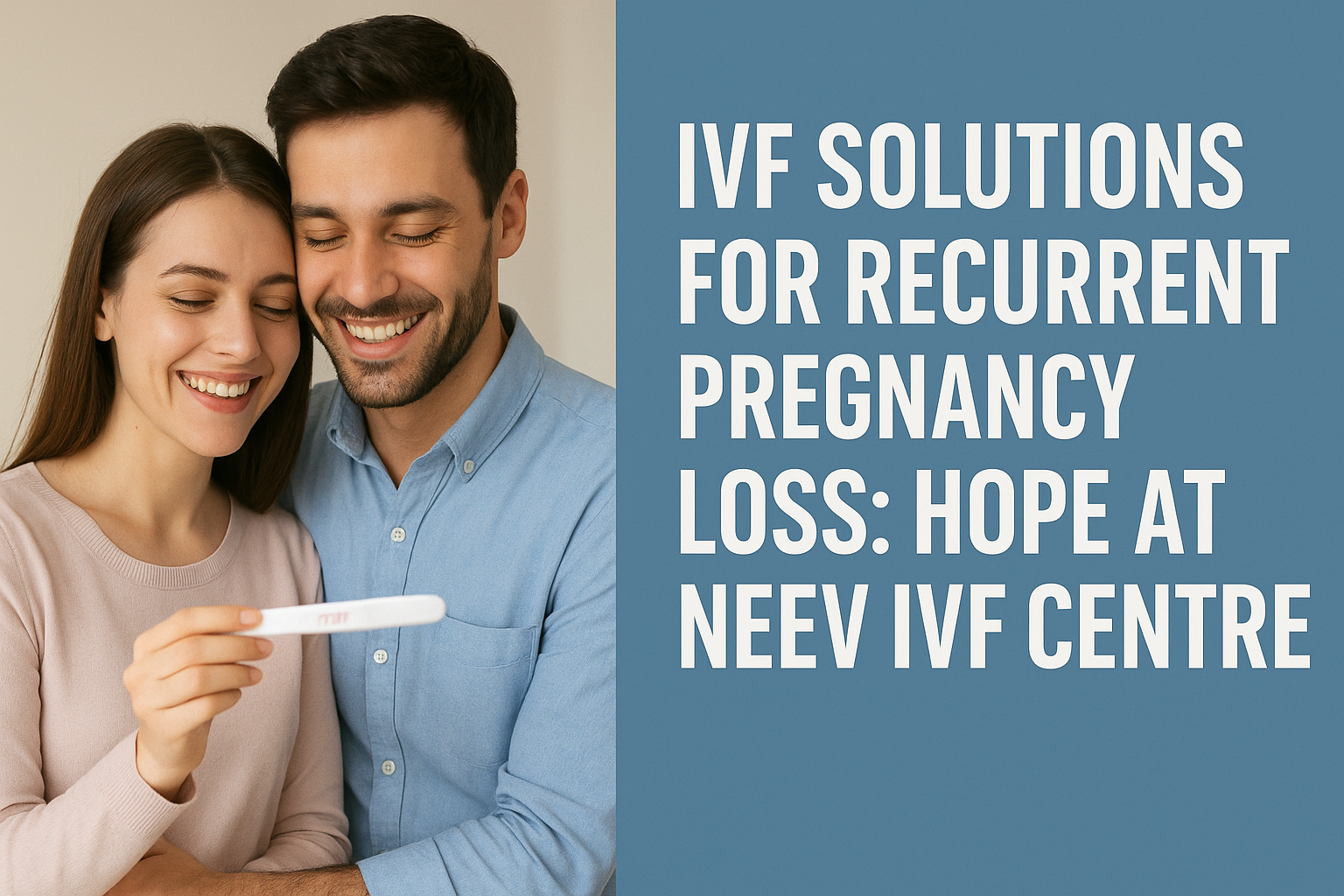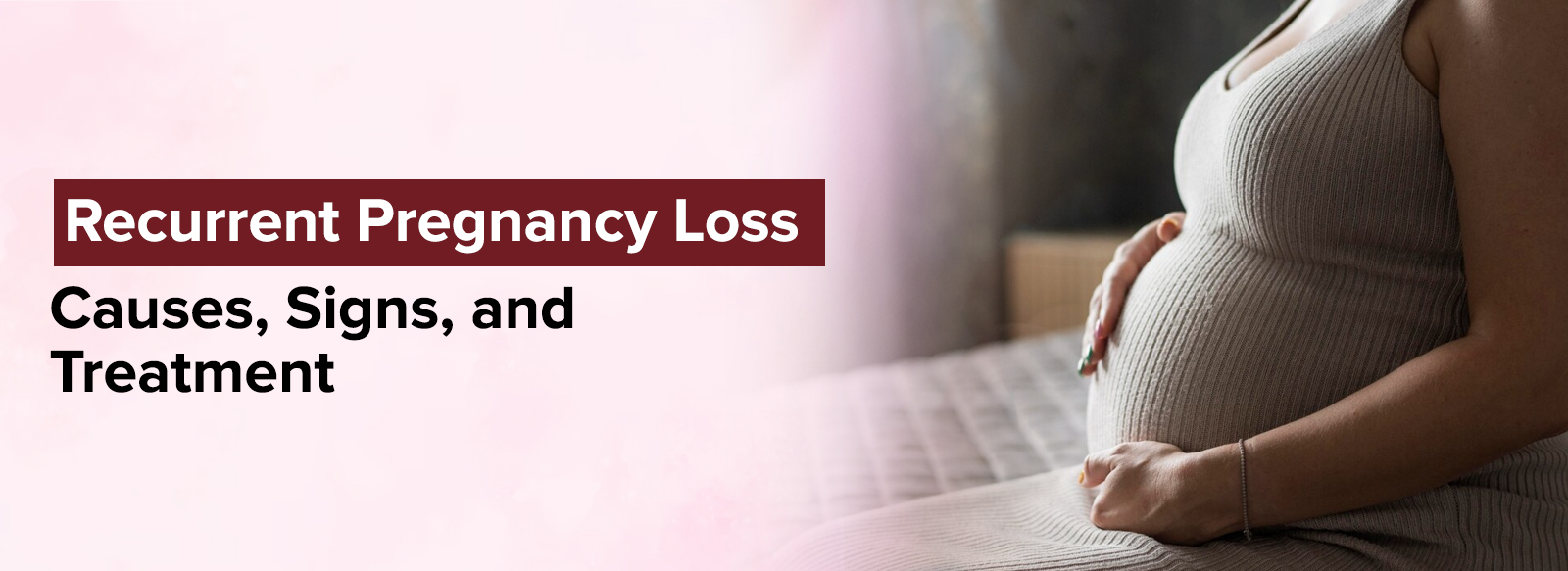
Experiencing pregnancy loss can be an emotional and challenging journey. Recurrent pregnancy loss (RPL) affects nearly 1 in 100 couples worldwide, leading to frustration, sadness, and sometimes hopelessness. However, advances in reproductive medicine, especially IVF solutions, offer renewed hope. At Neev IVF Centre, experts provide personalized care to help couples overcome recurrent pregnancy loss and achieve a successful pregnancy.

Recurrent pregnancy loss is typically defined as two or more consecutive pregnancy losses before 20 weeks of gestation. While occasional miscarriage can happen to any couple, repeated losses often indicate underlying medical, genetic, or lifestyle-related issues.
Common causes of RPL include:
Genetic Abnormalities:
Chromosomal issues in either the embryo or parents are a major cause of recurrent miscarriages. These may include aneuploidy, translocations, or inherited genetic disorders. Using Preimplantation Genetic Testing (PGT) during IVF can help detect these abnormalities and improve pregnancy outcomes.
Uterine Abnormalities:
Structural problems in the uterus, such as fibroids, uterine septum, polyps, or abnormal uterine shapes, can interfere with embryo implantation and growth. Surgical correction or advanced fertility treatments can help restore the uterine environment for a healthy pregnancy.
Hormonal Imbalances:
Hormonal issues like low progesterone, thyroid disorders, polycystic ovary syndrome (PCOS), or luteal phase defects can prevent proper implantation or increase miscarriage risk. Monitoring and correcting these imbalances are crucial for successful IVF or natural conception.
Immune System Issues:
Certain immune disorders, including antiphospholipid syndrome, autoimmune thyroid disease, or overactive immune response, can attack the embryo, leading to miscarriage. Specialized treatments, such as immunotherapy or aspirin/heparin therapy, can improve pregnancy chances.
Lifestyle Factors:
Lifestyle choices strongly impact fertility and pregnancy outcomes. Smoking, excessive alcohol consumption, high caffeine intake, obesity, unmanaged stress, and poor diet can all contribute to miscarriage. Maintaining a healthy lifestyle, proper nutrition, stress management, and regular exercise supports fertility treatments and improves IVF success.
Recognizing the root cause is essential to choosing the right treatment path. This is where the specialized team at Neev IVF Centre excels.
IVF (In Vitro Fertilization) offers more than just a solution for infertility. For couples experiencing recurrent pregnancy loss, IVF provides a controlled environment to select the healthiest embryos and enhance the chances of a successful pregnancy.
Benefits of IVF in RPL include:
At Neev IVF Centre, doctors guide every couple with compassion, combining medical expertise with emotional support.
Repeated pregnancy loss can take a toll on mental health. At Neev IVF Centre, trained counselors provide support to couples, helping them navigate grief, anxiety, and stress. Emotional well-being is considered an integral part of the IVF journey.
Many couples visiting Neev IVF Centre have overcome recurrent pregnancy loss and achieved healthy pregnancies. Personalized IVF solutions, expert care, and emotional support work together to create hope and real outcomes.
1. Can IVF guarantee pregnancy after recurrent pregnancy loss?
No fertility treatment can guarantee pregnancy, but IVF for recurrent pregnancy loss (RPL) combined with advanced genetic testing, personalized treatment plans, and expert care significantly increases the chances of a successful pregnancy. At Neev IVF Centre, fertility specialists use state-of-the-art protocols to address causes like chromosomal abnormalities, uterine issues, or immune-related miscarriage, maximizing the likelihood of a healthy pregnancy.
2. How does PGT help in preventing miscarriage?
Preimplantation Genetic Testing (PGT) screens embryos for chromosomal abnormalities, genetic disorders, and aneuploidy, ensuring only the healthiest embryos are selected for implantation. This advanced procedure reduces the risk of miscarriage and improves IVF success rates, particularly for women with recurrent pregnancy loss, advanced maternal age, or a history of implantation failure.
3. Is IVF safe for women who have had multiple miscarriages?
Yes. IVF for women with recurrent miscarriages is considered safe. Specialists at Neev IVF Centre monitor each patient closely with personalized hormone support, ultrasound monitoring, and fertility medications tailored to individual needs. Proper medical supervision ensures minimal risks, while supportive care addresses both physical and emotional well-being.
4. How long does the IVF process take for recurrent pregnancy loss cases?
A typical IVF cycle lasts about 4–6 weeks, including ovarian stimulation, egg retrieval, fertilization, and embryo transfer. However, women with recurrent pregnancy loss may require additional steps such as diagnostic testing, PGT, and endometrial preparation, which can extend the overall timeline. Fertility experts at Neev IVF create a customized plan to optimize success.
5. Does lifestyle affect recurrent pregnancy loss treatment outcomes?
Absolutely. Maintaining a healthy lifestyle, managing stress, eating a nutritious diet, and avoiding alcohol and smoking play a critical role in improving IVF outcomes and preventing future miscarriages. Regular exercise, proper sleep, and managing hormonal balance also support a healthy pregnancy, complementing medical treatments for recurrent pregnancy loss.
While no treatment guarantees pregnancy, IVF with genetic testing (PGT) and personalized care significantly improves success rates for women experiencing recurrent pregnancy loss. Combined with a healthy lifestyle, emotional support, and expert monitoring at Neev IVF Centre, patients have the best chance of achieving a safe, healthy pregnancy.
